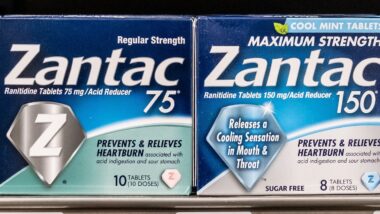 Azithromycin, a popular antibiotic commonly known by its brand name Zithromax, may cause azithromycin Steven Johnsons Syndrome in kids, lawsuits claim.
Azithromycin, a popular antibiotic commonly known by its brand name Zithromax, may cause azithromycin Steven Johnsons Syndrome in kids, lawsuits claim.
Azithromycin was first approved by the U.S. Food and Drug Administration in 1991 in order to treat a wide variety of bacterial infections in both adults and kids.
Children are often prescribed azithromycin as an alternative if they are allergic to the most common type, penicillin.
Though azithromycin has been approved for use in children, it has not yet been approved to treat children less than 6 months of age.
Azithromycin is manufactured by pharmaceutical giant Pfizer, Inc. Currently, azithromycin is one of the most popular antibiotics available.
Any drug, including drugs most children take at some point, like antibiotics, have some side effects. For the majority of children, azithromycin side effects are relatively tame.
These kinds of mild side effects are diarrhea, vomiting or simple skin rashes that go away on their own. However, for other kids, azithromycin can be painful, dangerous or even fatal.
Despite its popularity, the drug has in some cases allegedly caused azithromycin Steven Johnsons Syndrome in kids, a life-threatening condition.
Azithromycin Steven Johnsons Syndrome in kids is essentially an allergic reaction, and can start off relatively mild, like a simple skin rash. This is why it is important to be aware of any side effects of azithromycin or another drug in case it develops into something worse.
Following a number of adverse event reports, the U.S. Food and Drug Administration (FDA) has asked that the drug’s manufacturer, Pfizer Inc., include on the Zithromax label a warning about the increased risk of developing azithromycin SJS.
Azithromycin Steven Johnsons Syndrome in Kids
Steven Johnsons Syndrome (SJS) is a life-threatening skin condition, so it is essential to be aware of any azithromycin problems your child may experience while taking the antibiotic.
Azithromycin Steven Johnsons Syndrome in kids is an allergic reaction, but its symptoms can quickly grow to resemble burns. Over time, the purple or red rash spreads across the skin, blistering and peeling as the layers of skin die and shed.
Steven Johnsons Syndrome rashes can spread to cover large portions of the body. Once the rash has spread to more than 30 percent of the patient’s body, it is considered Toxic Epidermal Necrolysis, or TEN.
TEN is a more severe and dangerous form of SJS, and comes with a greater risk of fatality. TEN carries with it a 40 percent risk of fatality, compared with the 15 percent of regular SJS.
Azithromycin SJS Lawsuits
Plaintiffs in these lawsuits claim that, had they been adequately warned of the dangers surrounding azithromycin Steven Johnson Syndrome in kids, they would have chosen a safer alternative for their child.
If your child has experienced Steven Johnsons Syndrome or other serious symptoms after taking azithromycin, you should seek medical help immediately.
If you or someone you love has experienced these symptoms or has been diagnosed with Stevens Johnson Syndrome or Toxic Epidermal Necrolysis after taking azithromycin, you may have reason to file an azithromycin SJS lawsuit.
Do YOU have a legal claim? Fill out the form on this page now for a free, immediate, and confidential case evaluation. The Stevens Johnson Syndrome attorneys who work with Top Class Actions will contact you if you qualify to let you know if an individual lawsuit or class action lawsuit is best for you. [In general, SJS lawsuits are filed individually by each plaintiff and are not class actions.] Hurry — statutes of limitations may apply.
ATTORNEY ADVERTISING
Top Class Actions is a Proud Member of the American Bar Association
LEGAL INFORMATION IS NOT LEGAL ADVICE
Top Class Actions Legal Statement
©2008 – 2026 Top Class Actions® LLC
Various Trademarks held by their respective owners
This website is not intended for viewing or usage by European Union citizens.
Get Help – It’s Free
Help for Victims of Stevens Johnson Syndrome
If you or a loved one were diagnosed with Stevens Johnson Syndrome (SJS) or toxic epidermal necrolysis (TEN) after taking a prescribed or over-the-counter medication, you may be eligible to take legal action against the drug’s manufacturer. Filing an SJS lawsuit or class action lawsuit may help you obtain compensation for medical bills, pain and suffering, and other damages. Obtain a free and confidential review of your case by filling out the form below.
An attorney will contact you if you qualify to discuss the details of your potential case at no charge to you.
Please Note: If you want to participate in this investigation, it is imperative that you reply to the law firm if they call or email you. Failing to do so may result in you not getting signed up as a client, if you qualify, or getting you dropped as a client.
Oops! We could not locate your form.












